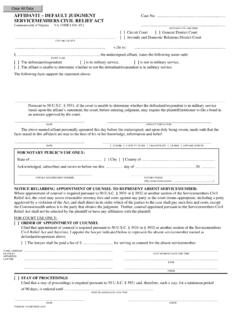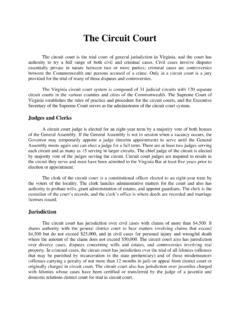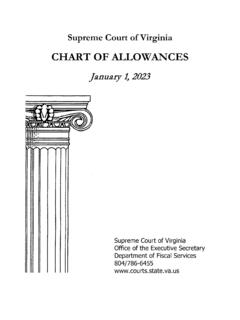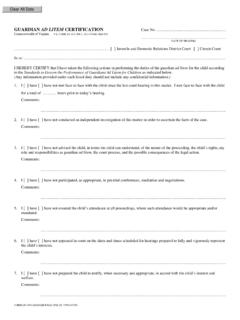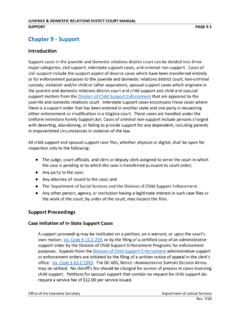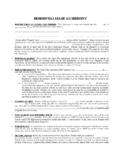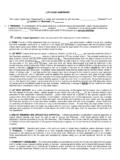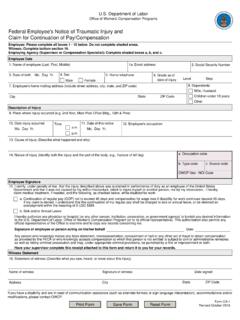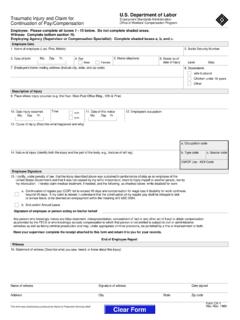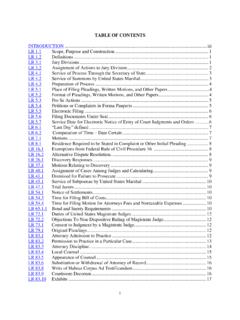Transcription of JDR Manual - The Official Web Site for Virginia’s ...
1 JUVENILE & DOMESTIC RELATIONS DISTICT COURT Manual JUVENILE TRAFFIC AND MISDEMEANOR TRAFFIC PROCEDURES PAGE 4-1 Office of the Executive Secretary Department of Judicial Services Rev. 7/20 - Juvenile Traffic and Misdemeanor Traffic Procedures Introduction In Virginia, most traffic offenses are classified as traffic infractions rather than as criminal offenses because of the relatively minor nature of most traffic violations. This classification simplifies processing minor offenses and allows the court to focus on the more serious traffic offenses. Many traffic infractions can be prepaid. The chief judge may provide by rule that any juvenile licensed to operate a motor vehicle who has been charged with a traffic infraction may waive court appearance and admit to the infraction or infractions charged if he or she and a parent, legal guardian, or person standing in loco parentis to the juvenile appear in person at the court or before a magistrate or sign and either mail or deliver to the court or magistrate a written form of appearance, plea and waiver, provided that the written form contains the notarized signature of the parent, legal guardian, or person standing in loco parentis to the juvenile.
2 For more serious traffic offenses, the court appearance may not be waived and prepayment of a fine is not an option. This section of the Manual presents a narrative description of the basic traffic case process. The sections following the narrative description present, in more detail, the major steps in processing a traffic case such as case initiation, pre-trial procedures, court processing, disposition, case closure, and disposition reporting. Narrative Description The traffic case process is initiated when an officer cites a motorist for a traffic violation. For traffic infractions or traffic misdemeanors, the officer will either issue a summons or have a petition issued. If a summons is issued, the juvenile is released on his written promise to appear.
3 For certain traffic violations and all Class 1 and Class II traffic misdemeanors, the juvenile will require a hearing for his/her attorney advisement. A clerk assigns a case number, indexes the case, and files the case papers by the next court date. The court should issue the proper hearing summons to the juvenile and one parent or responsible person when the case is initiated by a petition. The court appearance date is usually determined simply by the officer s next scheduled court day. For prepayable traffic infractions, the juvenile may choose to waive trial, enter a guilty plea and pay the fine and court costs prior to his scheduled court date. See JUVENILE & DOMESTIC RELATIONS DISTRICT COURT Manual , Fees & Prepayments.
4 To waive the court appearance and prepay the fine, the juvenile defendant appears in person in the clerk s office and requests information on the amount of fines and costs to be paid. The clerk verifies that the offense allows waiver of court appearance and determines the appropriate fines and costs. The juvenile defendant signs a waiver of court appearance and guilty plea, a parent also signs in front of a clerk or notary JUVENILE & DOMESTIC RELATIONS DISTICT COURT Manual JUVENILE TRAFFIC AND MISDEMEANOR TRAFFIC PROCEDURES PAGE 4-2 Office of the Executive Secretary Department of Judicial Services Rev. 7/20 public, and the juvenile pays the fines and costs. The clerk collects the fines and costs and issues a receipt.
5 If the transaction is handled by mail, the defendant must send the appropriate amount for fines and costs; juveniles must include a properly executed waiver of court appearance and guilty plea with a notarized parent s signature. Prior to a court date, the clerk retrieves all of the cases from the file for that court date and prepares the docket. Prepaid cases are entered on the docket with the disposition and fines and costs paid. On the trial day, the case files and the docket are sent to court. In court, all court actions are recorded in JCMS and on the summons or if in the case of petition, a DC-570, ORDER. Those juveniles charged with traffic infractions that do not prepay and who fail to appear for court are tried in their absence and a notice of the verdict and the fine and costs imposed is sent to their residence.
6 Those charged with traffic misdemeanors may be tried in their absence at the judge s discretion and the notice is sent to them as above; if there is no trial in absentia, a failure to appear warrant, bench warrant, or rule to show cause may be issued. These may also be issued when the juvenile is tried in absentia. The obligation for payment of fines and costs to the court accrues upon conviction and is due within thirty days of trial, but deferred or installment payment agreements shall be established by the court for those unable to make immediate payment. Each district court must accept payment by personal checks, credit/debit cards, cash, money orders, or cashier s checks. The juvenile is allowed ten days from the conviction date in which to file an appeal to the circuit court.
7 Upon appeal, the clerk refunds any fines or costs paid to the court, requires the juvenile to post an appearance bond as set by the court, if any, and transfers the case papers to the circuit court. If there is no appeal, the record of conviction is forwarded to the Department of Motor Vehicles. Pre- Trial Procedures Case Initiation A law enforcement officer issues the VIRGINIA UNIFORM SUMMONS to motorists violating state and local traffic laws. If the motorist is a resident of Virginia or a state with a reciprocal agreement with Virginia, then: The officer may issue a VIRGINIA UNIFORM SUMMONS for traffic infractions and misdemeanors. If a prepayable traffic infraction is charged, the officer may, or in the case of an accident which results in a prepayable traffic infraction charge shall, JUVENILE & DOMESTIC RELATIONS DISTICT COURT Manual JUVENILE TRAFFIC AND MISDEMEANOR TRAFFIC PROCEDURES PAGE 4-3 Office of the Executive Secretary Department of Judicial Services Rev.
8 7/20 also give the motorist a copy of DC-217, VIRGINIA PREPAYABLE OFFENSES INFORMATION SHEET which the officer may obtain through the clerk s office. Note: The juvenile is required to sign the summons and thus promise to appear for trial. For HOV (high-occupancy vehicle lanes) violations the charging officer may execute the summons by mailing it to the registered owner of the automobile used in the violation, and it shall be a rebuttable presumption that the registered owner was the motorist who violated the HOV statutes. Va. Code The officer forwards the summons to the clerk s office together with any subpoenas for witnesses issued by the officer. If a prepayable offense results in an accident, the clerk should issue subpoenas for witnesses only upon receipt of a request for a court hearing contained on DC-217, VIRGINIA PREPAYABLE OFFENSES INFORMATION SHEET.
9 The officer should take the juvenile before an intake officer from the court service unit if: The juvenile is a motorist from Virginia or a reciprocal state and: has refused to sign a summons, or is believed by the arresting officer to be likely to disregard a summons, or is subject to administrative impoundment of his motor vehicle or administrative suspension of his driver s license or privilege to drive; The juvenile is a motorist from a reciprocal state and is charged with: an offense for which a conviction or forfeiture of cash deposit requires a revocation of the juvenile s driver s license under Virginia law, or an offense for which the issuance of a citation (summons) in lieu of a hearing or the posting of collateral (cash deposit) or bond is prohibited by Virginia law.
10 The juvenile is a motorist from a non-reciprocal state. Parking violations are normally settled without a court case being initiated. If the motorist has not complied with the fine payment provisions of the parking citation, an authorized person in the county, city or town whose traffic laws were violated mails by first class mail a notice to the motorist that a traffic case will be initiated against him or her if the parking fine is not paid within five days from the date of receipt of the notice . If the motorist fails to comply within the five-day period, then the county, city or town may initiate a traffic case in the appropriate district court by requesting the clerk or magistrate to issue a DC-319, SUMMONS.

